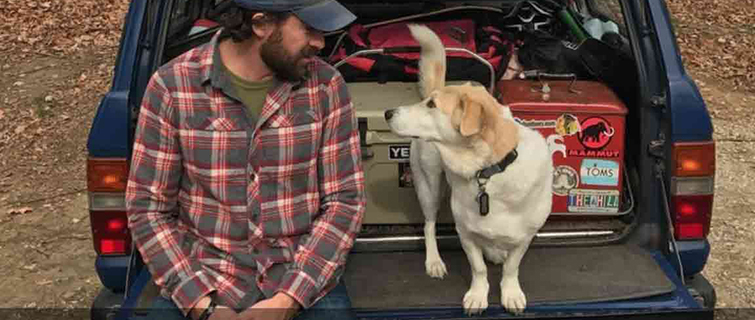
The dogs in the war zones mostly traveled in packs. Partly wild and wary of people, they had never received the kind of affection that could conceivably turn a stray into a pet. In Afghanistan’s impoverished Helmand Province, the villagers had barely enough food for themselves and their livestock, and certainly nothing to waste on a dog.
It was a hot day and U.S. Marine Sgt. Craig Grossi was bored when he decided to approach the funny-looking dog with the big head and too-short legs that had been hanging around his base in a converted farmhouse. Unlike the other strays, he always seemed to be alone, wandering through the outpost with his head held high, as if he knew something the others didn’t. It was against military policy to approach the animal: Grossi knew that. But he was curious—and remembered he had a piece of beef jerky in his pocket. He figured, what the heck, and walked toward him.
“He started to wag his tail, and this really sort of threw me,” Grossi said, recalling that the dog he would later name Fred was malnourished, dirty, and covered in bugs. What reason did he have to do that?
A Growing Friendship
In recognition of Veterans Day, Monday, November 13, Grossi, a graduate of Georgetown’s Bachelor of Arts in Liberal Studies program, answered questions at the School of Continuing Studies and read from his new book, “Craig & Fred: A Marine, a Stray Dog, and How They Rescued Each Other.”
The book tells the story of that first meeting; how Grossi and his fellow marines took Fred in, and perhaps most remarkably, how, with a lot of help, he was able to smuggle Fred out of Afghanistan so he could eventually be flown in a crate to John F. Kennedy International Airport in New York City, where Grossi’s family would pick him up.
That’s the basics of the story, but, as its title implies, the book is about much more. For Grossi, who would later be injured in a rocket attack, Fred exuded the kind of “stubborn positivity” that enabled them both not only to survive, but also to use their story to inspire others.
On that day about seven years ago when Grossi met Fred, he took the beef jerky from his pocket and offered it to the dog. Fred didn’t gulp it, but “took it into his front teeth, super gently,” Grossi said. Fred let Grossi scratch his head behind the ears, and when the marine turned to go, he felt the nudge of a nose on his ankle.
A Helicopter—and a Sign
Even after taking care of Fred—and sometimes having to hide him in a duffle bag—Grossi was unsure of whether he should take him home.
“I knew I loved the dog,” Grossi said. “I knew he was special, and in my heart I wanted to bring him home. But I needed a sign.”
That sign came when a helicopter arrived to take Grossi and other marines on a mission. Dogs are usually scared of helicopters because of the noise they make and the dust they kick up. But not Fred.
“He followed me to that helicopter,” Grossi said. “They have to train military dogs, big German Shepherds, to do that. To me, it was a sign.”
An Urge to Write
The book has many wonderful stories about the lengths Grossi and others had to go to keep Fred hidden and, eventually, put on a plane to the United States. But Grossi might never have written it if he hadn’t attended Georgetown. Like some other veterans, he had a hard time finding purpose when he returned to civilian life. How, for example, do you tell civilians that you received a moderate traumatic brain injury when an anti-tank rocket landed a few feet from you? Or that, after you recovered, you went back to the war?
But when he told them Fred’s story, people could understand and wanted to hear more. He talked about it when he was at bars or restaurants, and some listeners would tell him that he should write a book about it. So he quit an uninspiring job, took a risk, and enrolled in Georgetown’s program, where writing is infused throughout the curriculum. After a lot of practice, Grossi found out that not only could he write, but he also was pretty good at it—a natural, even.
And, perhaps best of all, he had a story to tell.
